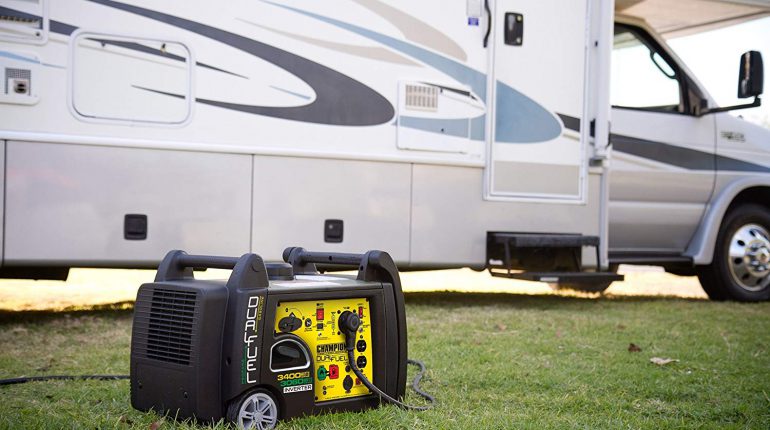As various appliances and essential systems on recreational vehicles run on electricity, securing a consistent source of power is the top concern of RV enthusiasts.
All in all, while different RVers opt to select different options, most agree that it’s a good idea to bring along a power generator. With a generator around, you may freely plan your RV camping trips without having to worry about energy shortages on the road. That being said, with so many models around, first-time RVers tend to find it tough to tell the best RV generator from mediocre ones.
Of course, buying on impulse is ill-advised as that likely makes you waste money on less than ideal models. Overall, if you wish to make a purchase that you won’t regret, you should keep these issues in mind.
Output
If you want to get the most out of the appliances on your rig then it’s of utmost importance that you give output some thoughts while assessing power generators. In the case that you don’t have a lot of things that run on electricity around, you may settle for models with standard outputs. On the other hand, if you own multiple high-draw devices such as microwaves, air conditioners, fridges and alike, you must prioritize high-output models. In general, if you nail the output, you and your fellow travelers would have a good time on the road.
Consumption
To perform as designed, generators need to be kept well-fueled which is why consumption rate is a major consideration. All in all, if you pick up a power generator that drinks fuel like you drink water, you could have a hard time fueling it. So to avoid a potential logistic headache, it’s strongly recommended that RVers choose models with reasonable fuel consumption rates. A number of generators available for purchase nowadays even feature eco-modes that ought to reduce consumption rates once engaged.
Noise
In use, power generators tend to make some noises but certain models on the market make less noise than the rest. Hence, if you prefer to have an undisturbed night’s sleep after a long day behind the wheel, you should grab a quiet generator. It’s also worth noting that various camping grounds for recreational vehicles have regulations regarding the sound levels of generators. That means if you use a generator that proves way too loud, few locations would welcome you and your RV.
Emission
Like noise, you must pay attention to emission if you wish to buy the best portable generator for RV. For your well-being, you need to stay away from models that release harmful exhausts into the surroundings during operation. To properly evaluate the emission of models on your shortlist, it’s widely suggested that you take a close look at customer reviews and see what people have to say. Many power generators claim to pass all kinds of emission tests but still let out unhealthy fumes so it’s essential that you take precautions.
Endurance
Since recreational vehicles experience vibrations and bumps from time to time, power generators for RV use need to be well-built to handle the stress. If you select a flimsy model, it’s going to fall apart in short order and force you to spend money on getting a replacement. Because of that, RVers should inspect and examine the constructions of generators prior to purchase. It’s also wise for you to check out aftermarket support from manufacturers: long warranties often indicate sound build qualities.
Generator Type
Modern RV-rated power generators usually run on an assortment of fuels with unique characteristics. Therefore, it’s a good idea to get to know the common types before deciding on what model to buy.
- Gasoline: Generally speaking, gasoline is unmatched in terms of availability: you would be able to find it everywhere you go. As a result, RVers that travel extensively hold gasoline generators in high esteem since keeping them fueled is a cakewalk. About the shortcomings, gasoline is highly combustible so you need to be careful around it. In addition to that, gasoline possesses a relatively short shelf life compared to other fuel types used by power generators. That means stockpiling gasoline in big volumes is ill-advised.
- Diesel: As diesel is less flammable than gasoline, diesel power generators have good safety records. The shelf life of diesel on average is superior to that of gasoline as well. Furthermore, diesel is highly affordable which makes it the ideal choice for budget-minded RVers. For drawbacks, diesel is uncommon in particular regions so if you go with a diesel generator, it may be tough to secure fuel on occasions. Also, once it comes to generators that run on diesel, RVers could only choose from a limited number of models.
- Propane: Lasts a long time, burns cleanly and comes in handy canisters, propane is considered to be the best all-around fuel for power generators. Because propane generators reduce carbon emissions in the outdoor environments, they tend to be well-liked by eco-conscious RVers. One disadvantage of propane is that it burns fast: a tank would be used up in the span of 24 hours. Thus, in extended trips, RV enthusiasts that own propane power generators must carry quite a few gas cylinders as fuel
